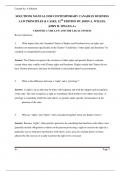Exam (elaborations)
SOLUTIONS MANUAL FOR CONTEMPORARY CANADIAN BUSINESS LAW PRINCIPLES & CASES, 12TH EDITION BY JOHN A. WILLES, JOHN H. WILLES A+
- Course
- Institution
- Book
SOLUTIONS MANUAL FOR CONTEMPORARY CANADIAN BUSINESS LAW PRINCIPLES & CASES, 12TH EDITION BY JOHN A. WILLES, JOHN H. WILLES A+...
[Show more]












